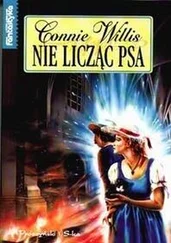“And—?”
“And I don’t know,” Joanna said wearily.
“He isn’t cute? Louisa said he had blond hair and blue eyes.”
“No, he’s cute. He—”
“Oh, no, please don’t tell me he’s one of those near-death nutcases.”
“He’s not a nutcase,” Joanna said. “He thinks NDEs are the side effect of a neurochemical survival mechanism. He’s found a way to simulate them. He wants me to work with him, interviewing his subjects.”
“And you said yes, didn’t you?”
Joanna shook her head. “I said I’d think about it, but I don’t know.”
“He doesn’t want you to do this simulation stuff, does he?”
“No. All he wants me to do is consult, interview subjects, and tell him if their experiences match the NDE core experience.”
“So what’s the problem?”
“I don’t know… I’m so far behind in my own work. I have dozens of interviews I haven’t transcribed. If I take on this project, when will I have time for my own NDE subjects?”
“Like Mrs. Davenport, you mean?” Vielle said. “You’re right. Gorgeous guy, legit project, no Maurice Mandrake, no Mrs. Davenport. Definitely sounds like a bad deal to me.”
“I know. You’re right,” Joanna said, sighing. “It sounds like a great project.”
It did. A chance to interview patients Mr. Mandrake hadn’t contaminated and to talk to them immediately after their experience. She almost never got the chance to do that. A patient ill enough to code was nearly always too ill to be interviewed right away, and the greater the gap, the more confabulation there was. Also, these would be subjects who were aware they were hallucinating. They should be much better interview subjects. So why wasn’t she leaping at the chance?
Because it isn’t really about NDEs, she thought. Dr. Wright saw the NDE as a mere side effect, a—what had he said?—“an indicator of which areas of the brain are being stimulated and which neurotransmitters are involved.”
It’s more than that, Joanna thought. They’re seeing something, experiencing something, and it’s important. She felt sometimes, like this afternoon with Greg Menotti, or with Coma Carl, that they were speaking directly to her, trying to communicate something about what was happening to them, about dying, and that it was her duty to decipher what it was. But how could she explain that to Vielle or to Dr. Wright, without sounding like one of Maurice Mandrake’s nutcases?
“I told him I’d think about it,” Joanna said evasively. “In the meantime, would you do something for me, Vielle? Would you check Greg Menotti’s records and see if his girlfriend’s phone number had a fifty-eight in it, or if there was some other number he might have been talking about, his own phone number or his Social Security number or something?”
Vielle said, “ER records are—”
“Confidential. I know. I don’t want to know what the number is, I just want to know if there was some reason he kept saying ‘fifty-eight.’ ”
“Okay, but I doubt if it’s anything,” Vielle said. “He was probably trying to say, ‘I can’t have had a heart attack. I did fifty-eight push-ups this morning.’ ” She took Joanna’s arm. “I think you should do the project. What’s the worst that could happen? He sees what a great interviewer you are, falls madly in love with you, you get married, have ten kids, and win the Nobel Prize. You know what I think? I think you’re afraid.”
“Afraid?” Joanna echoed.
Vielle nodded. “I think you like Dr. Right, but you’re afraid to take a chance. You’re always telling me to take risks, and here you are, turning down a terrific opportunity.”
“I do not tell you to take risks,” Joanna said. “I try to get you to avoid risks. It is the front down there in the ER, and if you don’t transfer out—”
The elevator dinged. “Saved by the bell,” Vielle said and stepped quickly into the elevator. “This could be the chance of a lifetime. Take it,” she said. “See you Thursday night. Nothing with dying in it. And remember,” she burst into song—“ ‘You’ve got a lot of living to do!’ ”
“And no musicals,” Joanna said. “Or dopey romances,” she added as the door closed on Vielle. Joanna pressed the “up” button, shaking her head. Love, marriage, children, the Nobel Prize.
And then what? Boating on the lake? An Angel of Light? Wailing and gnashing of teeth? Or nothing at all? The brain cells started to die within moments of death. By the end of four to six minutes the damage was irreversible, and people brought back from death after that didn’t talk about tunnels and life reviews. They didn’t talk at all. Or feed themselves, or respond to light, or register any cortical activity at all on Richard’s RIPT scans. Brain death.
But if the dying were facing annihilation, why didn’t they say, “It’s over!” or, “I’m shutting down”? Why didn’t they say, like the witch in The Wizard of Oz, “I’m melting, I’m melting”? Why did they say, “It’s beautiful over there,” and, “I’m coming, Mother!” and, “She’s too far away. She’ll never get here in time”? Why did they say “placket” and “fifty-eight”?
The elevator opened on fifth, and she walked across the walkway to the elevators on the other side. The Other Side. She wondered if this was how Mr. Mandrake envisioned the NDE, as a walkway like this. It was obvious he thought of the Other Side as a Hallmark card version of this side, all angels and hugs and wishful thinking: everything will be all right, all will be forgiven, you won’t be alone.
Whatever death is, Joanna thought, taking the elevator down to the parking lot, whether it’s annihilation or afterlife, it’s not what Mr. Mandrake thinks it is.
She pushed open the door to the outside. It was still snowing. The cars in the parking lot were covered, and flakes drifted goldenly, silently down in the light from the sodium streetlights. She lifted her face to the falling snow and stood there, watching it.
And how about Dr. Wright? Was dying what he thought it was—temporal-lobe stimulation and a random flickering of synapses before they went out?
She turned and looked up at the east wing, where Coma Carl lay boating on the lake. I’m going to tell Dr. Wright no, she thought, and started out to her car.
She should have worn boots this morning. She slipped on the slick snow, and snow filled her shoes, soaking her feet. Her car was completely covered. She swiped at the side window with her bare hand, hoping against hope it was just snow and not ice. No such luck. She unlocked the car, threw her bag in the backseat, and began rummaging for the scraper.
“Joanna?” a woman’s voice said behind her.
Joanna backed out of the car and turned to face her. It was Barbara from Peds.
“I’ve got a message from Maisie Nellis,” Barbara said. “She said to tell you she’s back in and that she has something important to tell you.”
“I know,” Joanna said. “I’ve already been up to see her. I understand she’s doing really well.”
“Who told you that?”
“Her mother. She said Maisie was just in for tests, and the new antiarrhythmia drug was working wonders. It isn’t?”
Barbara shook her head. “She is in for tests, but it’s because Dr. Murrow thinks there’s a lot more damage than showed up on the heart cath. He’s trying to decide whether to put her on the transplant list or not.”
“Does her mother know that?”
“That depends on what you mean by knowing. You’ve heard of being in denial, haven’t you? Well, Maisie’s mother is Cleopatra, the Queen of Denial. And positive thinking. All Maisie has to do is rest and think happy thoughts, and she’ll be up and around in no time. How did you get permission from her to interview Maisie about her NDE? She doesn’t even let us use the term heart condition, let alone death.”
Читать дальше












